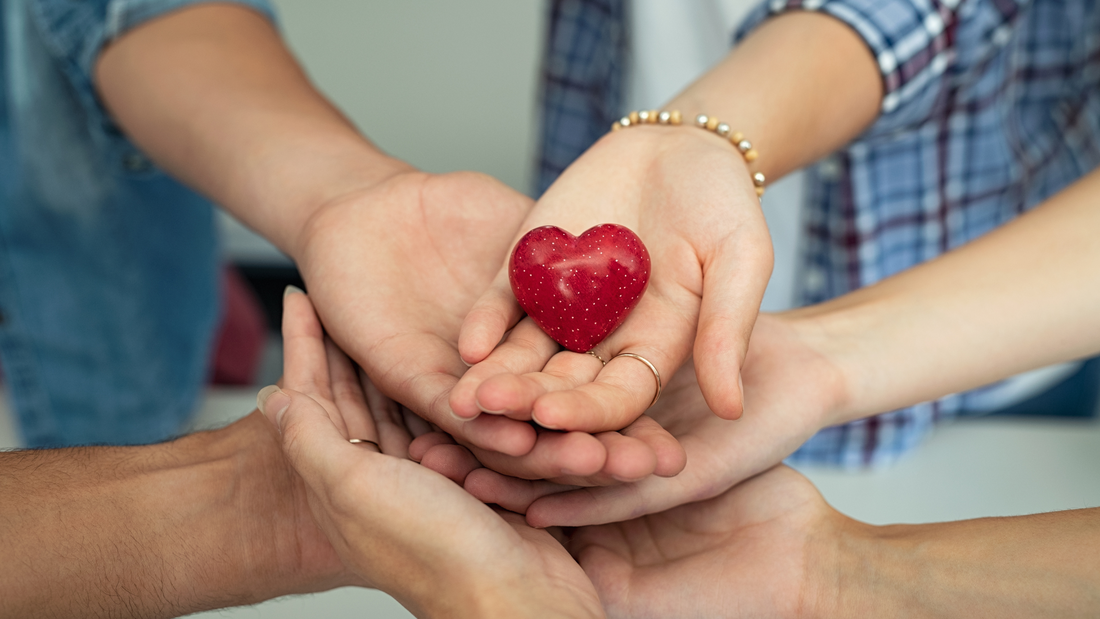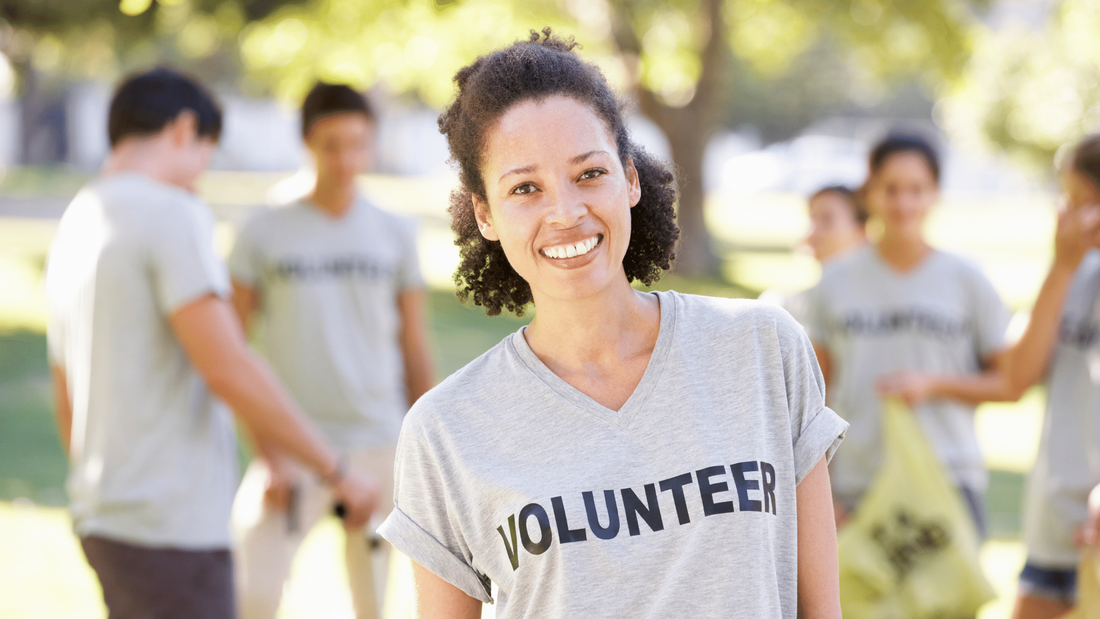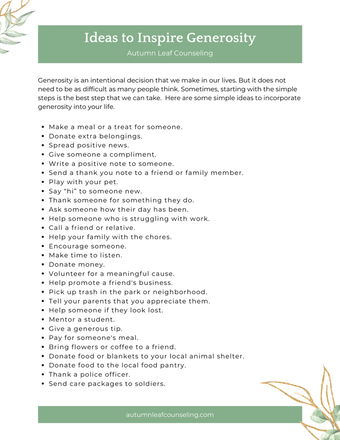|
From a young age, we’re told that “it’s better to give than to receive”. But, are we truly living our lives with this lesson in mind? Most of us want to be generous, but it’s easy to get overwhelmed with your own life and lose focus on helping others. And while some rarely offer help to other people, others seek opportunities and can be overly generous. Have you ever thought about why some people are generous while others are not? In this article, we’ll discuss the psychology of generosity, its benefits, and simple ways to practice generosity in your life. What is Generosity? “Generosity is giving good things to others freely and abundantly. Generous behaviors are intended to enhance the well-being of others. However, the giver can benefit, which distinguishes generosity from ‘pure’ altruism.” — Patricia Snell Herzog and Heather Price, Authors of American Generosity: Who Gives and Why Generosity comes in many forms such as giving time, money, attention, or other resources. While a generous gift or act can benefit the giver, it’s mainly intended to benefit the recipient, and there isn’t necessarily any expectation of a return. Often, generous acts are part of our everyday life in ways we don’t even realize. For example, you may have let a coworker borrow a book, brought a friend a much-needed cup of coffee, or spent a Saturday cleaning your closet to find clothes to donate. These little things can brighten someone’s day and make a big difference in their life. The Psychology of Generosity Generosity is important but why do some give while others don't? Numerous studies show that generosity is part of human nature. Children as young as 14 months are willing to help others by handing items out of reach and giving up their own possessions to others in need. Yet, that drive to give changes as children grow older. But why? Some studies show that feelings of empathy is an important factor. Empathy is the ability to sense other people’s emotions, coupled with the ability to imagine what someone else might be thinking or feeling. This helps us put ourselves in another’s shoes. For example, an empathetic person is more likely to experience a sense of oneness with a young man asking for spare change, and therefore more likely to help him. New research from the field of neuroeconomics supports this idea. Scientists at CalTech and Harvard found that the decision to give simply comes down to how much importance you attach to your interests versus someone else’s. So if you’re the type of person who considers other people’s needs as much as your own, generosity tends to be automatic. This study suggests that being more generous could be as simple as stopping to focus on how someone else might feel. Gender may have an impact on generosity. A 2010 study on charitable giving revealed that at all income levels women give more often and more generously than men. The author of this study speculated that “Women are socialized to take care of their families and their communities, and because of that socialization process we see the motives of empathy and caring. Women also score much higher on empathy and principle of care.” A second study using data from 3,572 American households found that one gender isn’t more generous than the other, but they do display charitable giving in different ways. Men, for example, tend to adjust their giving based on tax incentives and income. They give more money to fewer causes, while women support more charities at lower amounts. Generosity is a choice. Generosity is a trait that can be developed if you are open to trying, regardless of gender or level of empathy. But, why would you want to be more generous? There are several known physical health, mental, and social benefits to generosity. The Benefits of Generosity 1. Increases feelings of happiness. Giving our time and money gives our happiness levels a boost. When you look at the MRIs of people who gave to various charities, scientists have found that giving stimulates the mesolimbic pathway, which is the reward center in the brain. So, after an act of kindness, people report higher levels of happiness. Generosity and altruism were also found to be a major protective factor during the COVID-19 outbreak. For instance, a study published in the International Journal of Psychology revealed that the more altruistic young adults exhibited less psychological distress and less depressive symptoms. This is in line with evidence showing that altruistic and generous behavior is associated with better mental health. 2. Generosity has a positive impact on your physical health. Volunteering is a good way to increase physical activity - and physical activity is, of course, linked to better health. In addition, a 2016 study found that giving social support (any giving that had costs, including time, effort, or goods) was associated with better overall health, as measured by reduced stress and blood pressure. One innovative study found that generosity can also reduce CTRA gene expression, which is responsible for the development of inflammatory diseases like rheumatoid arthritis and cardiovascular disease. 3. Generosity builds confidence. When it comes to confidence, many people think of compliments and praise as confidence boosters. However, research studies show that being appreciated for giving has a greater and more positive effect on our confidence. Generosity allows us to feel more than just the joy we experience when we are giving, but also enables us to feel like a valued component in the lives of others, and this ultimately heightens our self-esteem. In times of hardship, acts of giving can be highly effective in rebuilding emotional and psychological strength. 4. It promotes healthy relationships. Relationships are more balanced when we’re not just focused on taking. This makes sense since most people want to interact with kind and giving people. Even during conflict and arguments, kindness can bring people together, as well as mend and heal rifts. There is significant research that shows that generosity is a key to successful, mutually-productive, long-term personal relationships as well as to professional relationships and personal career success. 5. You can make the world a better place. One of the primary benefits of generosity is to help others and to help make our communities better. Whether you have hope for humanity or you don’t, whether you think the world is getting better or worse, there’s always something that you can do to make life better for someone. How Can You Be More Generous? There are a number of simple ways to make generosity more intentional in your life. Here are a few ideas to get you started:
This worksheet is designed to provide more ideas and inspire generosity in your life: Ideas to Inspire Generosity Generosity is Beneficial to You and To Those Around You Generosity doesn't always happens by chance. Instead, it is an intentional decision that we make in our lives. But it does not need to be as difficult as many people think. Sometimes, starting with the simple steps is the best step that we can take.
What simple steps have you incorporated into your life to foster generosity? If you would like to speak with a professional, please reach out to schedule an appointment.
0 Comments
|
AuthorAs a therapist, Jorie Miklos enjoys helping people reach a level of personal happiness and satisfaction that they didn’t think was possible. Archives
January 2023
Categories |
|
© COPYRIGHT 2020. ALL RIGHTS RESERVED.
|
MENU
|
MENTAL HEALTH CRISIS LINES
If you need immediate help, call 911 or one of the crisis numbers below:
Crisis Line: 312-563-0445 Suicide Hotline: 1-800-273-8255 |
CONTACT
Jorie Miklos, MA, LCPC
Autumn Leaf Counseling 5757 S. Madison St. Hinsdale, IL 60521 630-228-6011 [email protected] |
Website created by Ready Set Go Website Design






 RSS Feed
RSS Feed
